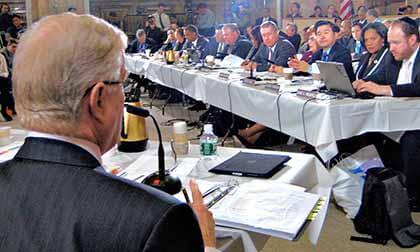By Connor Adams Sheets
The City Council held the first of a series of hearings into the city’s slow response to last month’s blizzard Monday afternoon.
The packed event in Manhattan was the first chance Council members had to publicly and directly question and chide apologetic city officials about their handling of the storm, which Mayor Michael Bloomberg had described as “inadequate” and “unsatisfactory.”
A focal point of the inquiries was the city’s failure to sufficiently address the snow removal needs of the outer boroughs, including those of Queens, which had many unplowed streets several days after the snow stopped falling, multiplying emergency response times and leaving thousands of residents stranded.
“At some point you’ve got to realize they weren’t plowing,” City Councilman Peter Vallone (D-Astoria), chairman of the Council Public Safety Committee, told city Sanitation Commissioner John Doherty during a heated exchange. “They may have been on the highways, they might have been in Manhattan, but they weren’t in Queens, they weren’t on Staten Island, they weren’t in Brooklyn.”
Doherty, Deputy Mayor of Operations Stephen Goldsmith, city Fire Commissioner Salvatore Cassano and city Office of Emergency Management Commissioner Joseph Bruno made up the public face of the Bloomberg administration at the hearing.
The officials recounted the events that transpired in the days before, during and after the storm, repeatedly admitted mistakes and failures the administration, introduced ways to ensure they do not take place during future storms, and found themselves defending their jobs.
“Today’s hearing will ensure the city learns the right lessons from this painful experience,” Goldsmith said. “We didn’t do the job New York City residents deserve …. Mayor Bloomberg and I are fully committed to understanding what went wrong and addressing those issues.”
Goldsmith then presented a six-part breakdown of key areas where “the city’s response was inadequate”:
• The decision not to declare a snow emergency.
• A city’s lack of ability to track its response efforts in real-time and adjust accordingly.
• Insufficient and delayed deployment of city assets.
• Failure to procure and deploy sufficient private resources, such as private tow truck operators.
• Insufficient internal and external communication.
• Problems with emergency communications and response.
The outline also detailed the city’s plans to address the issues through a litany of changes, such as technological upgrades, improving communications and boosting its ability to quickly deploy resources.
The city’s failure to declare a snow emergency and delay opening the city’s command center angered many Council members who believe those decisions were the root cause of many other problems.
“I appreciate the recognition that the failure to declare an emergency or a snow emergency, which was well within the mayor’s ability, was a mistake,” Council Speaker Christine Quinn (D-Manhattan) said. “On Dec. 25, when [the National Weather Service] declared a blizzard watch, was the time when we should have gone to looking at a snow emergency.”
Goldsmith admitted that making such a declaration “could have yielded a better response” and said the city is evaluating new protocols for deciding when to do so.
Councilwoman Elizabeth Crowley (D-Middle Village), chairwoman of the Council Fire & Criminal Justice Committee, effectively called for more heads to roll. As of Tuesday afternoon, only one citwide official, John Peruggia, chief of the FDNY’s Emergency Medical Service, had been demoted and none had been fired in the snowstorm’s wake.
“The responsibility to declare a snow emergency does not fall on his shoulders, so why is he the only one who got the demotion? Why is he the fall guy?” she asked the administration panel.
Another major focus of the hearing was on the the storm’s impact on emergency response times. The normal average response time to the most severe 911 calls is under six minutes, according to Bruno. During the height of the storm, he said, average response times were as long as 55 minutes, a result in large part of unplowed streets causing more than 100 ambulances to get stuck in snow.
Reach reporter Connor Adams Sheets by e-mail at csheets@cnglocal.com or by phone at 718-260-4538.


































